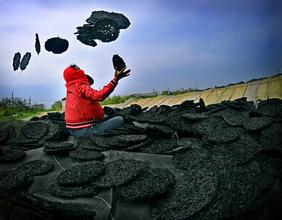Xiapu, the oldest town in eastern Fujian, Xiapu City, Fujian has many natural harbors along its coastline.
霞浦,闽东最古老的县份-福建霞浦市-漫长的海岸线为这里制造出众多的天然港湾。
The sea has become a natural laver farm.
大海已然成为了种植紫菜的一座水上农场。
Lin Renzhuo, a fisherman in Xiapu, is going to erect some more bamboo posts in his farm.
霞浦渔民,林仁灼,今天要为自家的农田再架设几枝毛竹。
When I was 18, I began to learn how to plant laver from my dad.
我十八岁那一年跟老爸学习种紫菜。
Now it's been 28 years.
我种了二十八年了。

The preliminary procedures aim to hollow the just felled bamboos to make it easy to erect them at the sea bottom.
从山上砍来的毛竹要经过预先处理把里面的竹节疏通以方便把毛竹插入海底。
Wind and waves may make it more difficult.
海面上插毛竹有风有浪的话比较辛苦。
Each bamboo is at least 16 meters long.
毛竹每根长16米以上。
It's not easy to accomplish the task in the sea.
把它架设在海里不是一件轻松的工作。
Lin patrols his farm every day.
在田间地头巡视管理是老林每天必做的工作。
When the tides ebb, the nets emerge.
潮水一落,网帘悬于海面以上。
Young laver plants can enjoy sunshine and undergo photosynthesis.
紫菜苗进行光合作用享受阳光空气。
When the tides rise, the sprouts will absorb nutrient from the water.
涨潮时,紫菜苗浸入海水中充分吸收养分。
The tides repeatedly rise and fall, and the harvest season finally comes again.
潮涨潮落间,又到了紫菜收获的季节。
The release of laver flavour totally relies on baking.
紫菜的味道是靠烘烤产生的。
Heat leads to the transformation of its pigments and cells.
加热使紫菜的色素和细胞发生变化。
It's why laver plants become more fragrant after baked.
这就是烘烤后的紫菜味道更加芳香浓烈的原因。
The harvest season ends, but Lin's work continues.
收获的季节结束了,但林仁灼的工作并没有结束。
Here, nature and human beings have jointly created a kaleidoscope of natural scenes.
在这里,自然与人工的合力演变出万千的视觉景象。



